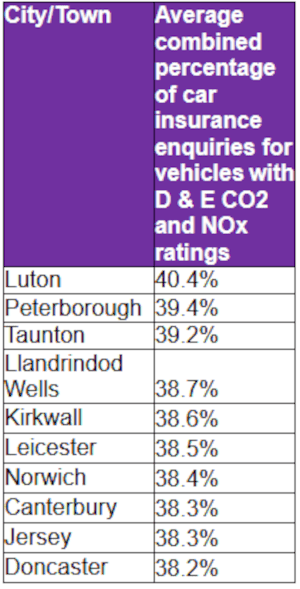
Despite the increasing popularity of greener vehicles, more than one in three (36%) cars in the UK fall into the worst two categories for harmful carbon dioxide (CO2) and nitrogen oxide (NOx) emissions, according to recent research by price comparison site MoneySuperMarket.com.1,2
The study combines insurance enquiry volumes for car makes and models with data from the AIR Index, which ranks vehicles from A (most environmentally friendly) to E (least environmentally friendly).
Figures reveal that the most enquired about car in the UK, the 2008 Volkswagen Golf, is rated C for CO2 and D for NOx.1,2 The contribution of this model to road pollution may therefore be significant, due to its prevalence and low performing emissions scores.
Across the UK, Luton has the highest concentration of vehicles with the worst CO2 and NOx ratings, with over two-fifths (40.4%) of car insurance enquiries being for models in categories D or E. Following closely behind are Peterborough and Taunton, averaging 39.4% and 39.2% respectively.1,2
Despite a considerable number of cars with poor CO2 and NOx ratings on the roads, the environmental impact of vehicles is high on British motorists’ agendas. Two-thirds (66%) of car owners say they considered the environmental impact of their latest vehicle before purchasing it, with a third (33%) saying it was the primary consideration.3

With the 2030 ban on new petrol and diesel vehicles on the horizon, the data shows a shift in mindset, with over half (52%) now saying that the environmental impact of a vehicle would be the primary consideration when deciding which car to buy next.3
Nearly two-fifths (39%) say they are more likely to buy a hybrid car or electric car specifically due to the ban, while almost a third (28%) say it’s causing them to think more carefully about the harmful impact cars have on the environment.3
In total, two thirds (66%) of motorists worry about the impact their current car has on the environment. But it appears drivers are willing to put their money where their mouth is when it comes to going green, stating they would be prepared to spend £2,384 more on average for a vehicle that was better for the environment.3
Notes
[1] MoneySuperMarket car insurance enquiry data from 1st January 2021 to 26th September 2021
[2] Data taken from airindex.com AIR Index
[3] Consumer research conducted between 17th September 2021 and 21st September 2021







